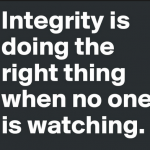Rules are a two way street…
 I recall at high school participating in a debate “Rules are meant to be broken.” To be honest I cannot recall if I was on the affirmative or negative side, nor whether we won or lost – however I have never forgotten the topic.
I recall at high school participating in a debate “Rules are meant to be broken.” To be honest I cannot recall if I was on the affirmative or negative side, nor whether we won or lost – however I have never forgotten the topic.
In recent media coverage this old topic has come back to me – however I am certain that my perspective now is totally different.
The wearing of a school uniform is often the way schools enforce the rules that they have – I recall being in a private girl’s school and seeing a student on detention because she has the wrong coloured hair tie – I was outraged – surely this was taking the rules a bit far – I questioned how the colour of a hair tie impacted on educational outcomes, surely teachers and principals had bigger issues to concern themselves with … then I heard David Koutsoukis speak about the Broken Window Theory made popular by Malcolm Gladwell’s book The Tipping Point.
A quick search on Wikipedia explains… (click here for full information)
The broken windows theory was first introduced by social scientists James Q. Wilson and George L. Kelling, in an article titled “Broken Windows” which appeared in the March 1982 edition of The Atlantic Monthly.[1] The title comes from the following example:
Consider a building with a few broken windows. If the windows are not repaired, the tendency is for vandals to break a few more windows. Eventually, they may even break into the building, and if it’s unoccupied, perhaps become squatters or light fires inside.
Or consider a pavement. Some litter accumulates. Soon, more litter accumulates. Eventually, people even start leaving bags of refuse from take-out restaurants there or even break into cars.
So back to the school rules… if a rule is broken and is not dealt with then it looks like no-one cares and the I don’t care either attitude creeps in. This is how it escalates.
My husband and I had a discussion with our children (aged 12 & 14) last night – Mr 14’s school rule is, and was stated clearly in the school newsletter lately, that students are not to wear their sports jacket (school issue with logos ) to, during or from school – yet Mr 14 does – his argument is “no-one ever tells him off” – in fact he wore it today and says “the Principal saw me and never said anything.”
In a similar refrain, Miss 12 ‘s school does not allow chocolate biscuits, junk food, food colouring etc in lunch boxes – yet when we say no at home we hear, “Sam had one yesterday and the teacher didn’t say anything!”
So there in lies the challenge – and the two way street – as parents we have seen the rules and are working to reinforce them with our children, however they perceive that it is not an issue as they are not told off. For us as parents, it sometimes seems like a losing battle…
Maybe these rules seem like a good idea when management meet and decide on the behaviour that is acceptable or not. Perhaps, however with the added pressures on teachers to cross and tick so many boxes, additional paperwork etc and with a class of thirty students, teachers have far more pressing issues to deal with than whether a student has the correct coloured hair tie, their socks up or a healthy lunch.
The bigger picture for me is the wonderful quote “Integrity is what you do when no one else is watching.” It is the bigger picture of our education system – preparing students for life by teaching them to do the right thing, not for reward, through ego or for points on a scoreboard – but simply because it is the right thing to do. It is picking up the rubbish because it will make the place look tidier, not because you know someone will reward you for it. It is about helping the person that has run out of petrol, rather than driving past and thinking someone else will do it. Offering to help a neighbour or stranger to lighten their load and so on. Ultimately I believe this is the bigger goal of education; teaching students to have integrity, values and a moral compass to lead them to success in whatever form that takes.
 So all of this begs the questions…
So all of this begs the questions…
– In what ways might schools and parents be working together to achieve the same standards?
– What kind of rules are appropriate?
– How are rules reinforced?
– What are we truly teaching in the classroom?
Images from: www.capitalretailsolutions.com, www.muscogeemoms.com and schools.tdsb.on.ca
Tags: broken window theory, rules
Published on Wednesday, June 25th, 2014, under Rules


I have mixed feelings over this. One of the “mixes” is that the school should be practicing self-management. I have no worry if the rule were “neat, tidy and clean.” I know that’s more subjective and a more objective rule is easier to rule on, but then the management of hair is personalised back to the student and he has the responsibility to self-manage. As it is when he leaves the authority of the school he is left without the skill of self-managing his hair. If that sounds confused, read my article in the latest Teachers Matter magazine and it will be clearer.
As for the piece about the school having rules and not enforcing them, this was one of my challenges as a principal. If teachers wanted a rule I always insisted on a debate about how it was going to be enforced, who was going to do it etc. The problem is the broken window. If you have a rule and don’t enforce it respect for the law, for authority, gets eroded. It’s not unique to schools. Bike riding without helmets is endemic in our city.
Yes – the issue perhaps moves from schools to society – I agree with the self management – it is what I stand for, however it does start with knowing the boundaries and as they say in the US Military – ‘staying within the rumble strips.
Hi Karen,
A very timely blogpost.
I’ve been following a discussion on a fb post recently.
The post asks how people feel about the situation where a Wellington student has taken his case to court wishing to return to school, having been suspended, for tying his hair back rather than cut it short.
http://bit.ly/1nARxxe
Judith
Yes – I believe the balance between the school and parents needs to be addressed – the old adage “it takes a village to raise a child” means schools and parents need to be on the same side, not fighting each other.
Thank you Karen. In a world that at times appears to have gone mad and lost the plot this article puts a refreshing perspective on things we often do and don’t do and then get all mad about.because people don’t listen. We forget people hear action and inaction more so than words. You have shared a great comment on how culture develops. And how to develop it intentionally using one of life’s great principles.
My take is we often get an imbalance between rights and responsibility. I have a right to wear my hear as I chose but if I belong to a community I have a responsibility to ensure I wear it so as not to offend others. In other words just because I can doesn’t mean I do.
Yes – I like the distinction between rights and responsibilities – thanks for your comments
Integrity… that is a great concept to bring into the debate around school rules and how we can support our children and young people to develop that sense of integrity. It worries me when I hear children saying things like “I picked up some rubbish, can I have a sticker?!”… gives me the heebie jeebies. So we need to consider what we are teaching when relying on extrinsic motivation, don’t get me wrong, I love stickers but don’t want them to become the basis of the relationship I have with students. The other thing is if students are thinking about what they might get if they do something then they may actually be mentally distracted by the task at hand and the learning opportunities.
Sorry, may be a little off topic here!
No it is all on topic – I am bombarded by teens everyday saying “why should I work harder for a Merit or Excellence – cos you don’t get any more for it” or this attitude… “Do I get credits for doing this? If not why bother”
It is all the bigger picture… seeing the relevance maybe a key…
Hi Karen
Great blog thank you!
Rules are put in place for a reason and should therefore be respected and enforced. However all rules should be evaluated from time time for their relevance and effectiveness and adapted or chaged if needed. This is how we can remain current as a society that is continuously changing.
Last Sunday the one of our Church leaders spoke from stage wearing jeans with ‘fashion tears’ across the knees. Even 5 years ago in this church (which is big – 5000 members) this would have been frowned upon big time. Today – she is considered ‘hip’ at 40 years old!
In regards to the boy in Napier – I would have liked to have seen the boy submit to the rules and then an intelligent discussion take place between all the school’s parents and the school board to determine if the current rule can be adapted to be more current and to suit everyone.
That would be to tie up long hair so that it is not untidy (which I assume is the reason for the current rule). Women and men are no longer differentiated by their hair and yet that particular rule still does.
I think the parents and the school have both become ‘bloody minded’ over this issue with both parties determined to win for the sake of winning.
Yes – I do think this hair issue has highlighted the need for rules to be evaluated and the fact that parents and schools need to be providing a united front – it takes a village to raise a child – however we all need to be on the same page. The good part of all of this is that it has opened up the conversation…
Hi Karen,
Yes I believe that consoltation is the best way forward,whether between teachers and parents, or on the larger arena between teachers and the government. The lack of consoltation with teaching professionals regarding the governments offer of $349m to education is an example of this.Consoltation, communication and context all play their part…
Hi Karen,
Great reading, I wrote about rules recently in Teachers Matter. Having fewer rules I believe is the starting point – because as someone once said ‘the more rules you have the more likely someone somewhere is breaking one’! Choose your battles is another line I’ve heard before! Let’s focus on important essential rules that lead to effective management of people and as Alan Cooper said leave some room for self management.
Yes – the fewer rules the better and only ones you are going to enforce 🙂 Love your articles in the Teachers Matter Magazine – thanks for your support 🙂